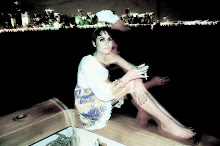She told me, You are a romantic writer. In today’s world there is no room for such a type. People are not readily favorable of such a language. People may not be willing to listen.
My response was simply, Maybe not now. But my writing is not necessarily for the now, nor the people of today. I am a lyrical historian and my voice will not change just for the ears of today’s people.
Then after, and now reflecting back, I am not even sure that my writing is that of a Romantic. I try to visually collect the samples of all my writing. What are they? What are they about? Love? Ek, I don’t even think so.
How could I possibly have my writing favor the motif of “romantic love” in the way it is easily understood: coupled relationship—if in actuality all I am after/seek taking control of in my own life is independence and the self’s relationship in solitude. The exploration of self-love.
I question all this because I, too, am trying to figure out where to pair my writing, how to further it, what to make it a collection of. What I do seems so contradictorily of natural suspicion. Sure, the writing I wish to pursue is romantic in the sense that I only imagine language to be lyrical. I want it to play like music—make the body mentally and physically move, even after it ceases to play. But the actual content of my writing analyses, unravels and reveals the conflict of another type of romance: 1) a romance of the self in a relationship with the other. A romance that one struggles with, a romance that evokes scenes that are staged, performed—a romance that is a self-designed play. Therefore, relationships become for one’s self, more than they are for the other. Intimacy strangles the self. It is something one is not comfortable with—it is an act one hides from. 2) A romance that is understood, explained, experienced and highly dependent upon sensation. This relationship begs for intimacy, craves touch and is seen in the dark confines of the night. Is it a dream? Or is it an ideal?—which is also a dream. Think: in the act of “making love” one is told early on that it is only appropriate to close your eyes. We are instructed, we are guided, at our earliest stages to seal tight our eyelids, close the curtains of our eyes, see at first black and then imagine a scene, a scenario, an ideal fantasy that will take us to a moment or moments of climax. Is ecstasy only achieved in dream? Is dream only awoken in the intoxication of ecstasy? Is The Ideal the figure of highest pleasure?
The romances of my writing are noncommittal. Subjects share nothing. They give. These romantic relationships are involved for the pleasure of receiving. Perhaps, my characters at the core are all femme fatales. Through others’ mystical essences they look for sensations, both erotic and lyrical, they look for words given in conversation (they do not share words because they speak at each other) to be evocative and provocative. This type of romance is explored for the heightened moments that will hopefully awaken one to a different state (reality?) or a different intellectual understanding. Relationships are sought for the emotional awakening necessary for insight. Are my characters most concerned with romance in the way of what the other can do to them—how the other can make one feel—and how one can make and change the other by their own self power? If so romance, more than ever, seems harmful.
And under all that explanation, still, what the hell is it all about?
Monday, December 10, 2007
Subscribe to:
Post Comments (Atom)









No comments:
Post a Comment